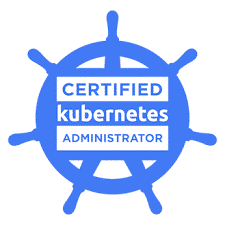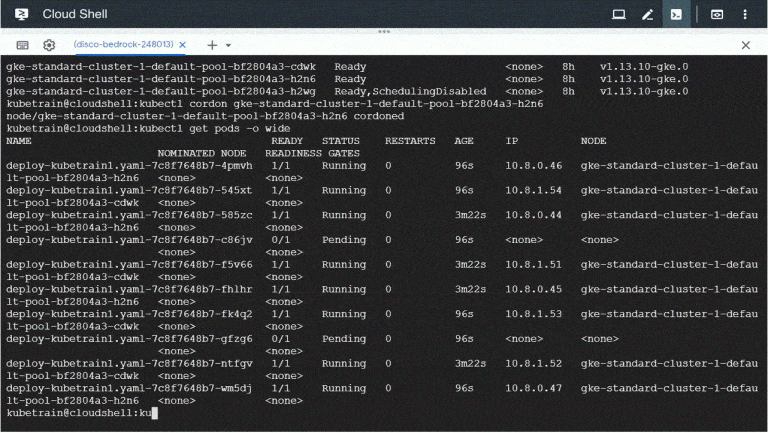Obiettivi | Certificazione | Contenuti | Tipologia | Prerequisiti | Durata e Frequenza | Docenti | Modalità di Iscrizione | Calendario

Il Corso Kubernetes Administrator CKA è strutturato per offrire ai partecipanti una profonda comprensione e abilità pratiche nell’utilizzo di Kubernetes. Il corso affronta vari aspetti come l’architettura di Kubernetes, l’installazione e configurazione di un cluster, la gestione di applicazioni containerizzate, la creazione di servizi di rete e storage, e l’utilizzo di strumenti di monitoraggio e di registrazione. Inoltre, si esplorano strategie di sicurezza e meccanismi di autoscaling. Il corso contribuisce alla preparazione dell’esame per la Certificazione Kubernetes Administrator (CKA).
Sintesi Statistica :
- Corsi realizzati: 78;
- Numero Corsisti: 639;
- Superamento Esame: 89,15%
Contattaci ora per ricevere tutti i dettagli e per richiedere, senza alcun impegno, di parlare direttamente con uno dei nostri Docenti (Clicca qui)
oppure chiamaci subito al nostro Numero Verde (800-177596)
Obiettivi del corso
Di seguito una sintesi degli obiettivi principali del Corso Kubernetes Administrator CKA:
- Comprendere le architetture e i componenti base di Kubernetes.
- Imparare l’installazione e la configurazione di un cluster Kubernetes.
- Gestire applicazioni containerizzate usando i manifesti YAML.
- Creare e gestire servizi di rete e storage.
- Implementare strategie di sicurezza e meccanismi di autoscaling.
Certificazione del corso
Esame Certified Kubernetes Administrator (CKA); Questo esame è focalizzato sulla valutazione delle competenze e conoscenze nell’ambito di Kubernetes. I candidati vengono testati su vari argomenti tra cui l’architettura dei cluster Kubernetes, installazione e configurazione, workload e scheduling, servizi e networking, storage, troubleshooting e sicurezza. L’obiettivo è valutare la capacità del candidato nell’eseguire compiti correlati a questi argomenti utilizzando l’interfaccia a riga di comando di Kubernetes e le API di Kubernetes.
Contenuti del corso
Basics Of Kubernetes
- What Is Kubernetes?
- Components of Kubernetes
- Challenges
- Other Solutions
- Borg Heritage
- Kubernetes Architecture
- Terminology
- Innovation
- User Community
- Tools
- Resource Recommendations
Installation And Configuration
- Installation Tools
- Installing kubectl
- Using Google Kubernetes Engine (GKE)
- Installing with kubeadm
- Kubeadm – upgrade
- Installing a Pod Network
- More Installation Tools
- Installation Considerations
- Main Deployment Configurations
- Compiling from Source
Kubernetes Architecture
- Main Components
- Control Plane Node
- Worker Nodes
- Kubelet
- Operators
- Service Operator
- Pods
- Rewrite Legacy Applications
- Containers
- InitContainers
- Component Review
- API Call Flow
- Node
- Pod Network
- Container to Outside Path
- Services
- Services Network
- CNI Network Configuration File
- Pod-to-Pod Communication
Apis And Access
- API Access
- RESTful
- Checking Access
- Optimistic Concurrency
- Using Annotations
- Simple Pod
- Manage API Resources with kubectl
- Access from Outside the Cluster
- Namespaces
- Working with Namespaces
- API Resources with kubectl
- Additional Resource Methods
- Cluster Configuration Files
- API Maturity
Api Objects
- API Versions
- Discovering API Groups
- Deploying an Application
- DaemonSets
- ReplicaSets
- Autoscaling
- Jobs
- CronJobs
- RBAC
Managing State With Deployments
- Deployments
- Object Relationship
- Deployment Details
- Deployment Configuration Metadata
- Deployment Configuration Spec
- Deployment Configuration Pod Template
- Deployment Configuration Status
- Scaling and Rolling Updates
- Deployment Rollbacks
- Using DaemonSets
- Labels
Volumes And Data
- Introducing Volumes
- Volume Spec
- Volume Types
- Shared Volume Example
- Persistent Volumes and Claims
- Persistent Volume
- Persistent Volume Claim
- Static Provisioning
- Dynamic Provisioning
- Secrets
- Using Secrets via Environment Variables
- Mounting Secrets as Volumes
- Portable Data with ConfigMaps
- Using ConfigMaps
Services
- Service Update Pattern
- Accessing an Application with a Service
- Service Types
- Service Types (Continued)
- Services Diagram
- Overall Network View
- Local Proxy for Development
- DNS
- Verifying DNS Registration
Helm
- Deploying Complex Applications
- Helm v3
- Chart Contents
- Templates
- Chart Repositories and Hub
- Deploying a Chart
Ingress
- Ingress Controller
- Ingress API Resources
- Deploying the Ingress Controller
- Creating an Ingress Rule
- Multiple Rules
- Intelligent Connected Proxies
Scheduling
- Kube-scheduler
- Filtering (Predicates)
- Scoring (Priorities)
- Scheduling Policies
- Pod Specification
- Specifying the Node Label
- Scheduler Profiles
- Pod Affinity Rules
- PodAffinity Example
- PodAntiAffinity Example
- Node Affinity Rules
- Node Affinity Example
- Taints
- Tolerations
- Custom Scheduler
Logging And Troubleshooting
- Basic Troubleshooting Steps
- Ephemeral Containers
- Cluster Start Sequence
- Monitoring
- Managing Plugins
- Logging Tools
- Understanding Fluentd
- Journaling
Security
- Overview
- Cloud Security Considerations
- Accessing the API
- Authentication
- Authorization
- RBAC
- Admission Controller
- Security Contexts
- Pod Security Policies
- Network Security Policies
- Network Security Policy Example
- Default Policy Example
Attività Laboratoriali
- How to connect to lab
- Install Kubernetes
- Work with the cluster
- Imperative and declarative
- API
- API Discovery
- Anatomy API Request
- Namespace
- Labels
- Running Pods
- Running Multi-container Pods
- Pod Lifecycle
- Implementing container probes
- System Pods and Controllers
- Create Deployment
- Create Deployment-Replicaset
- Update a Deployment
- Rolling back Deployment
- Scaling a Deployment
- Creating a Daemonset
- Executing Jobs and CronJobs
- Storage Static Provisioning
- Storage Dynamic Provisioning
- Environment Variables
- Secrets
- Private Container Registry
- ConfigMap
- Scheduling
- Scheduling with Affinity and Antiaffinity
- Node Cordoning
- Calico CNI Plugin
- Configure CoreDNS
- Services
- Service Discovery
- Ingress
- ETCD
- Upgrade Kubernetes
- Logging
- JSONpath
- Monitoring with Metric Server
- Troubleshooting Node failures
- Troubleshooting Control Plane failures
- Troubleshooting Workloads
- Authentications
- Manage Authorizations
- PKI on controller
- Create a certificate for a new user
- kubeconfig and context
- RBAC
Tipologia
Corso di Formazione con Docente
Docenti
I docenti sono Istruttori Certificati Kubernetes CKA e CKAD e certificati in altre tecnologie IT, con anni di esperienza pratica nel settore e nella Formazione.
Infrastruttura laboratoriale
Per tutte le tipologie di erogazione, il Corsista può accedere alle attrezzature e ai sistemi presenti nei Nostri laboratori o direttamente presso i data center del Vendor o dei suoi provider autorizzati in modalità remota h24. Ogni partecipante dispone di un accesso per implementare le varie configurazioni avendo così un riscontro pratico e immediato della teoria affrontata. Ecco di seguito alcuni scenari tratti dalle attività laboratoriali:

Dettagli del corso
Prerequisiti
Competenze sistemistiche e di networking di base.
Durata del corso
- Durata Estensiva 30 Ore;
- Durata Intensiva 4gg;
Frequenza
Varie tipologie di Frequenza Estensiva ed Intensiva.
Date del corso
- Corso Kubernetes Administrator CKA (Formula Intensiva) – 06/05/2024 – 09:00 – 17:00
- Corso Kubernetes Administrator CKA (Formula Estensiva serale) – 20/05/2024 – Lun. Mer. 18:30/21:30
- Corso Kubernetes Administrator CKA (Formula Intensiva) – 08/07/2024 – 09:00 – 17:00
- Corso Kubernetes Administrator CKA (Formula Intensiva) – 09/09/2024 – 09:00 – 17:00
- Corso Kubernetes Administrator CKA (Formula Intensiva) – 11/11/2024 – 09:00 – 17:00
Modalità di iscrizione
Le iscrizioni sono a numero chiuso per garantire ai tutti i partecipanti un servizio eccellente.
L’iscrizione avviene richiedendo di essere contattati dal seguente Link, o contattando la sede al numero verde 800-177596 o inviando una richiesta all’email [email protected].


